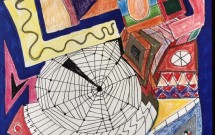
I define the patriarchal wound as ancestral suffering and intergenerational trauma caused by the power imbalance between genders. Under patriarchy, boys, men and the masculine are considered inherently superior while girls, women and the feminine are considered inherently inferior. The extreme social positionality of superior vs. inferior causes distance between the genders and distorts the possibility of true partnership between gender groups. Masculinity (strength, rationality, action and the mind) is promoted as positive and femininity (intuition, feeling, receptivity, and the body) is silenced, humiliated and violated. Every family impacted by gender-based violence is still in the process of healing. It touches all of our lives. Think about it for a moment. How has patriarchy affected your life?
Patriarchy defines a strictly binary code for masculinity and femininity and is intolerant of multiple or fluid/trans gender identities. This gender imbalance is perpetrated through religious ideologies, colonialism, post-colonialism, legal and economic systems, cultural norms and family patterns. The patriarchal wound may be experienced and expressed differently by boys, girls, men, women, trans persons, lesbians, gay men and other gender and sexual groups. However, all persons suffer from its impact.
This wound impacts our psychological, emotional, spiritual and physical well-being. It is a wound of grief and loss. Under patriarchy we are each only allowed a narrow spectrum of expression through the assigned gender roles. Boys who are too feminine are often targets of gender-based violence and may be bullied and ridiculed. They may be physically or sexually violated. They violate the rules of patriarchy as they are granted male privilege at birth, but this is revoked if they display a preference for feminine forms of expression. Girls who are too masculine are shamed and marginalized. They, too, may be physically attacked or sexually violated. Gay, lesbian, bisexual, queer, trans people can be similarly targeted. This is seen as righteous punishment for gender transgression. The limiting of human experience and expression through overt and covert forms of gender-based violence distorts and undermines our full capacity as members of humanity.
In addition, the patriarchal wound has profoundly ruptured our sense of belonging to the Earth. In the dualistic patriarchal paradigm, nature is body; girls/women are bodies; men and women of color are also primarily identified as bodies. These bodies are not regarded as holding the same capacity for consciousness. Those of us primarily viewed as bodies are reduced. We fill up the background against which the real actors of society take their leading roles. Our capacity is underestimated. Yet it is up to us who have been marginalized to tell the necessary stories and provide the leadership for conscious change.
The patriarchal paradigm also insists that nature be reduced to resource instead of understood as it is: life source. As a result of this error in thinking and subsequent erroneous economic policies and practices that are centered on private wealth accumulation instead of mutual flourishing, we are facing mass extinction, the death of the seas, anxiety, isolation, despair and suicide. We are coping with domestic violence, sexual violence, economic disparity, climate change, toxic hyper-masculinity and wounded helpless femininity. We all suffer when intolerance and hatred of diversity result in state-sanctioned violence directed at children. And this is our situation in this country today. Patriarchy has failed. It inhibits flourishing, and what is life for if not to flourish?
To heal the patriarchal wound, we first must recognize how we have been coerced to participate in a system that does not support life on Earth. Gender inequity and the exploitation of nature for profit appear normal, but they are not. They are the result of a particular cultural pattern. How do we break free of this pattern and begin to live and love differently?

An old saying among different indigenous peoples is that the longest journey we must undertake is to follow the road between our heads and our hearts, so that we learn to think with our hearts. What does this mean? Perhaps the suggestion is to trust the innate intelligence of the heart, of a feeling-centeredness that seeks belonging with others and the Earth. Perhaps it suggests that we explore what it means to be in partnership – neither the dominator nor the dominated. Instead we begin to experience ourselves as co-creators in mutual relationships with other people and the places we live. We learn to listen even more deeply and to speak ever more honestly. Together we are responsible for the creation of a shared reality.
As we question the patterns of patriarchy, we may consider the impact of our choices. We can determine to take back our lives from false constructs that do not serve us or the Earth. We can choose to honor and appreciate the great diversity of life over uniformity. We can love our bodies, embrace our feelings, and be more connected to ourselves and the places we call home. We can challenge patterns of domination and exclusion that privilege white, male elites over all other people and the plants, animals, waterways, and soils of the Earth.
Ultimately, it is up to us, collectively and collaboratively, to re-imagine the human-nature connection, the fluidity of gender and sexual identities, and to join with others who share our quest to live meaningful lives amidst the upheaval of change.
This blog is excerpted from a longer paper, Healing the Patriarchal Wound in Euro-America, which is required reading for students enrolled in Multicultural Awareness.
 Southwestern College Santa Fe, NM
Southwestern College Santa Fe, NM




